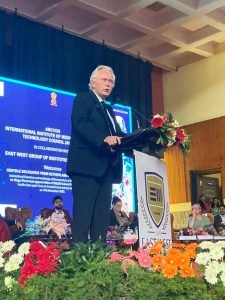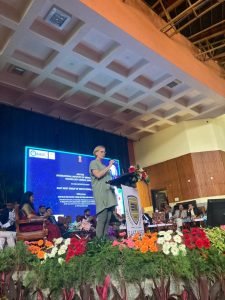MOU Signing with Govt. of Netherlands
Currently IIMSTC signed a MoU with Stitching Maithri, Netherland with the support of Municipality of The Hague, Govt.of Netherland. The MoU offers 200,000 employment opportunities for the Paramedtronics candidates in Netherlands.
IIMSTC is joined hand with East West Group of Institutions – one of the pioneer and premier Nursing Institution in Karnataka who has declared as a Urban Training Partner of IIMSTC in India. IIMSTC is also associated with Electronics Sector Skills of India and Indian Medical Association (AMS).

GUIDELINES FOR NURSING TRAINEES WHO INTENTS TO APPLY FOR MIGRATION TO NETHERLAND
It is imperative that the nursing candidates apply for migration through any recruiters or employers, it is mandatory to follow these guidelines in accordance with the COMMON GLOBAL SCALE – TABLE 1 (CEFR 3.3):
Common European Frame work Reference levels which is stated as follows,
“It is desirable that the common reference points are presented in different ways for different purpose. For some purposes it will however be appropriate to summarise the set of proposed Common Reference Levels in a holistic summarized table. Such a simple ‘global’ representation will make it easier to communicate the system to non-specialist users and will provide teachers and curriculum planners with orientation points”. (PDF attached)
The CEFR is clearly mentioned about documentation of examination and assessment criteria as per the bench mark designed by the country.
Developing an assessment tool together
Many organizations struggle with the question of how to reliably assess competencies. Testing and examining skills and behavior requires a different measuring instrument than measuring cognitive knowledge alone. We are happy to develop this reliable assessment tool together with you. Think, for example, of a practical test, assessment or theory exam. In this process, we follow our step-by-step plan based on the PDCA cycle. In this way, evaluation and further development are immediately guaranteed.
The 7-step plan
- Planning
Know what you want to measure - Construction of the assignments
Form and supervise a construction group that develops questions - Setting an exam
Check the exercises - Production of the exam
Choose an administration method, e.g. digital or paper - Administering the exam
Ensure safe administration conditions - Standardization and determination
of results Collect, process and analyze your candidates’ data - Evaluation and aftercare
Identify improvements and work on them
CIVIC INTEGRATION: EXAM REQUIRED
Anyone who wants to integrate in the Netherlands is obliged to learn the Dutch language. And to learn how Dutch people live and work. This is stated in the Civic Integration Act. Integrators can take exams at different language proficiency levels: A2, B1 and B2. Cito develops several components for these language proficiency exams.
Central Institute of Test Development (Centraal instituut voor toetsontwikkeling)
Cito’s share
Commissioned by the Ministry of Social Affairs and Employment, Cito is developing the Civic Integration Exam. For the Inland Civic Integration Exam, we are responsible for the content of the Knowledge of Dutch Society (KNM) component and the Listening and Speaking A2 language components. The language exams measure language level A2 of the Common European Framework of Reference.
Cito develops the exercises, trains the Speaking assessors, is involved in the processing of the results and conducts research into the quality of the Civic Integration Exam.
Language exams
During the exam, DUO will check whether you know enough about the Netherlands. And whether your Dutch is good enough.
There are language exams at different Language levels Link opens external page: A2, B1 and B2. The State Examination Nt2 (Dutch as a second language) has a language exam for level B1 (Programme I) and a language exam for level B2 (Programme II). And there are knowledge exams. Check My Civic Integration to see which exams you need to take. These are the language exams:
SPEAK
The Speaking at level A2 exam is done on the computer. You must speak and understand Dutch. You watch videos and answer questions. The exam lasts 35 minutes.
The Speaking at level B1 and B2 exams take about 30 minutes to complete. On staatsexamensnt2.nl Link opens external page information about the content.
LISTEN
The Listening at level A2 exam is done on the computer. You will be asked about videos and you will listen to texts. The exam lasts 45 minutes.
The Speaking at levels B1 and B2 exams last 90 minutes. On staatsexamensnt2.nl Link opens external page information about the content.
READ
The Reading at level A2 exam is done on the computer. You need to read texts. You will also need to answer questions. The exam lasts 65 minutes.
The B1 Level Reading exam takes 110 minutes to complete. The B2 level reading exam takes 100 minutes. On staatsexamensnt2.nl Link opens external page information about the content.
TO WRITE
The A2 level writing exam is done with pen and paper. You will be given 4 writing assignments. For example, you write a short letter. Or you can fill out a form. The exam lasts 40 minutes.
The B1 and B2 Writing exams last 100 minutes. On staatsexamensnt2.nl Link opens external page information about the content.
Visit weblink: Taking exams: Knowledge exams – DUO Inburgeren
Learning Dutch in The Hague region
Luckily for those wishing to learn Dutch in The Hague region, there are plenty of options. Whether you’d like to undertake an intensive course, follow a weekly group course to learn and meet people at the same time, or join a free course, there’s plenty of options. Find our which requirements are needed to learn Dutch.
Dutch language requirement for studies and naturalization
It’s always a good idea to learn the language of the country you live in and learning Dutch will help you with integration into your new home. If you’d like to obtain Dutch nationality, or a permanent residence permit in the future, you will have to pass various Dutch examinations.
For some people, it is mandatory to complete an inburgering as part of their immigration process. Language schools in the Netherlands work with The Common European Framework of Reference for Languages CEFR to classify the level of difficulty of their courses starting from A1 for beginners to C2 for advanced language proficiency.
There is a minimum requirement for Dutch language proficiency if you want to apply for Dutch citizenship through naturalisation, or a place in a Dutch vocational or higher education institution. Following are some general requirements:
- Dutch civic integration exam ‘inburgeringsexamen’
Minimum requirement of A2-level for certain residence permits, like non-temporary residence permit, as well as Dutch citizenship. - State exams Dutch as a second language NT2 I ‘Staatsexamen NT2 Programma I’
Minimum requirement of B1 level for studies in a vocational institution ‘middelbaar beroepsonderwijs‘ (MBO). - State exams Dutch as a second language NT2 II ‘Staatsexamen NT2 Programma II’
Minimum requirement of B2 level for studies in a university ‘hogescholen’ (HBO).
NT2 ‘Nederlands als tweede taal’ Dutch as a second language, is a Dutch language qualification that is recognised by the Dutch government and other organisations. The certification proves that you have achieved a solid command of the Dutch language. Depending on your residence status or goals, completion of this course may be required and may even be subsidised in your integration process.
FREE DUTCH COURSES AND PROGRAMMES
Follow the course ‘Introduction to Dutch’ for free through the FutureLearn platform. This three-week course is taught by Dutch and English lecturers of the University of Groningen and will help you learn the basics of the Dutch language.
‘Het Begint met Taal’ is a non-profit organisation that organises the ‘kletsmaatjes’ (Chat buddy) programme which connects volunteers with newcomers to help them them improve their Dutch proficiency through regular online chats.
Oefenen.nl is a free online platform for anyone who wants to practice their Dutch through online exercises.
The libraries in the city of The Hague offer a programme called ‘Taal in de Bibliotheek’, which offers free weekly Dutch practice sessions with others learning the language in the central library (located next to the City Hall), and all of the local neighbourhood libraries. If you live in Delft, there is the language centre at TU Delft, which offers courses both to students/employees and the general public.
Find the full list of Dutch language schools, language courses, conversation groups and more on our website or the Taalhuis Den Haag.
FIVE TIPS TO LEARNING DUTCH
- Allow yourself to make mistakes.
- Practice any way you can, including listening to Dutch music, watching local TV programmes and reading Dutch (children’s) books.
- Ask people to speak Dutch with you – even if they start speaking in English.
- Team up with others who are learning Dutch.
- Do not worry about your accent.
VISIT WEBSITE LINKS FOR BETTER UNDERSTANDING ON YOUR MIGRATION:
https://www.thehagueinternationalcentre.nl/immigration-to-the-netherlands
https://www.thehagueinternationalcentre.nl/visa-application-procedure-for-highly-skilled-migrants
https://www.thehagueinternationalcentre.nl/checklist-for-highly-skilled-migrants
Taking the exam: Practice – DUO Integration (inburgeren.nl)
Or visit link for exam practice: https://www.inburgeren.nl/examen-doen/oefenen.jsp
For more practice: https://npokennis.nl/program/13/net-in-nederland
Course duration asper Mondrian: https://www.rocmondriaan.nl/alle-opleidingen/nederlands-voor-beginners-den-haag
More insights on Dutch Language learning: https://delftmama.nl/learning-dutch-in-delft-2021-update/
Dr.Sreedhar Saraswathy
Chairman,IIMSTC





